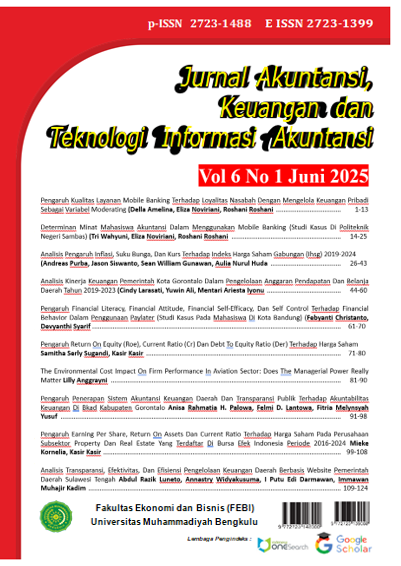ANALISIS PENGARUH INFLASI, SUKU BUNGA, DAN KURS TERHADAP INDEKS HARGA SAHAM GABUNGAN (IHSG) 2019-2024
DOI:
https://doi.org/10.36085/jakta.v6i1.8224Abstract
This study aims to analyze the influence of macroeconomic variables—inflation, the benchmark interest rate (BI 7-Day Reverse Repo Rate), and the rupiah exchange rate against the US dollar—on the movement of the Composite Stock Price Index (IHSG) in Indonesia during the period from January 2019 to December 2024. The method used is a quantitative approach with time series analysis using the Vector Error Correction Model (VECM), equipped with a stationarity test, optimal lag test, Johansen cointegration test, Granger causality test, and Impulse Response Function (IRF) and Variance Decomposition analysis. The results of the study indicate that inflation and the benchmark interest rate have a positive and significant effect on the IHSG in the short and long term, although contrary to conventional theory. The rupiah exchange rate has a negative effect on the IHSG in the short term, but turns positive in the long term. In addition, the IHSG shows a rapid adjustment mechanism towards long-term equilibrium (error correction coefficient of -53.14%). This finding emphasizes the importance of exchange rate dynamics as a dominant variable, and provides strategic implications for investors and policy makers in managing Indonesian stock market sentiment.
Keywords: Inflation, BI 7-Day Reverse Repo Rate, Rupiah/USD Exchange Rate
References
Sholikah, F. P., Putri, W., & Djangi, R. M. (2022). Peranan Pasar Modal dalam Perekonomian Negara Indonesia. Arbitrase: Journal of Economics and Accounting, 3(2), 1–12. https://doi.org/10.47065/arbitrase.v3i2.496
Saputra, V. R., Hasmarini, M. I., & Soebagyo, D. (2025). Analisis Pengaruh Suku Bunga Bank Indonesia, Nilai Tukar, dan Inflasi terhadap Indeks Harga Saham Gabungan (IHSG) di Bursa Efek Indonesia Periode 2010–2023. Management Studies and Entrepreneurship Journal, 6(3), 1969–1978. https://doi.org/10.37385/msej.v6i3.7523
Febriyanti, H. F., & Delfiani, S. (2023). Pengaruh Inflasi, Suku Bunga Bank Indonesia, dan Nilai Tukar Rupiah Terhadap Indeks Harga Saham Gabungan (IHSG). Jurnal Manajemen Stratejik dan Simulasi Bisnis, 4(1), 41–51. https://doi.org/10.25077/mssb.4.1.41-51.2023
Hijrianti, I., Maulana Fadilah, F., Shamurti, J. S., Junaedi, J., & Kustina, L. (2024). Pengaruh Inflasi, Suku Bunga, dan Nilai Tukar terhadap IHSG di BEI. Margin: Jurnal Lentera Manajemen Keuangan, 2(1), 1–12. https://doi.org/10.59422/margin.v2i01.231
Yuliandera, G. S., Veri, J., & Sari, S. Y. (2024). Dampak Inflasi, Nilai Tukar dan Suku Bunga terhadap Indeks Harga Saham Gabungan (IHSG): Studi Kasus di BEI 2014–2023. Jurnal Akuntansi Keuangan dan Perpajakan, (E-ISSN 3063 8208), hlm. 1–13.
Imroatul F., Indrawati, M., & Rusdiyanto, R. (2025). Pengaruh Nilai Tukar Rupiah, Tingkat Suku Bunga dan Inflasi terhadap IHSG Periode 2020–2023. Jurnal Ekonomi dan Bisnis (EK&BI), 7(1), hlm. …. https://doi.org/10.37600/ekbi.v7i1.1329



















